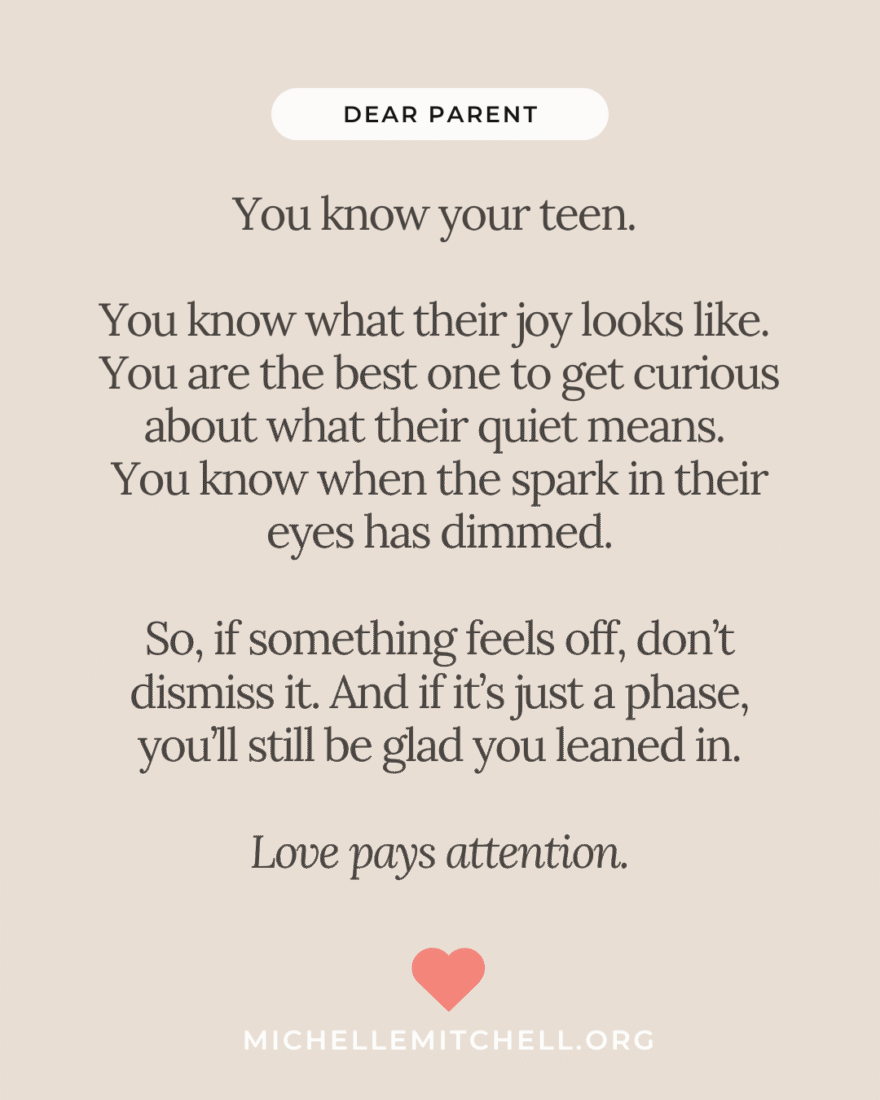michelle's blog
When to Worry: What’s Normal and What’s Not
read

The adolescent years are a time of intense change. Brains are remodelling, hormones are surging and identities are forming. We expect ups and downs. But if our once-chatty teen suddenly goes quiet, and is unwilling to come out of their room, we worry. If our once easy-going tween is erupting in screaming fits and fights that just aren’t their usual style, we worry.
Somewhere along the line, every parents asks, “What is normal development, and when should I be concerned?” There are a whole range of uncomfortable and inconvenient moods and behaviours that are developmentally normal in adolescents.
We know they are on track if they:
- Are showing signs of wanting control and independence
- Have their own ideas and values
- Are having inner conflict with moral decisions and are wrestling with either/or decisions
- Move from anger to sadness when faced with things they can’t control
- Are curious and playful. This is a key sign of emotional health
- Can rely on and rest in adult care
It’s also typical for adolescents to have:
- More difficulty sleeping
- Care more (and sometimes too much) about what peers think
- Swing between childlike and teen-like in the same hour
- Experience intense emotions, sometimes out of the blue
- Seem highly motivated by their agenda and apathetic about yours
- Resist advice, especially when they feel micromanaged
- Forget things you told them yesterday (or 5 minutes ago)
- Experiment with identity
- Crave being seen as capable and respected
- Feel pressure to “have it all together” but not know how
Two Concerning Clues
I am most concerned when kids move significantly from their baseline, are struggling to articulate what they are feeling, and are unable to enjoy life. At this point there is often persistence and significant impact on their day to day life. Some questions that might help you unpack this are:
- Is the feeling or behaviour happening across different settings (home, school, social)?
- Is the feeling or behaviour reasonable given the circumstances?
- Is the feeling or behaviour impacting their ability to function (eat, sleep, relate, learn) and how long has this been impacting them?

The below table is adapted from several trusted sources, including Middle Path Counselling’s article on teenage behaviour. I hope it draws a helpful comparison between what is typical behaviour as opposed when to be concerned and seek help. Please note that it is not a diagnostic tool but a reflection tool.
Typical Adolescent Behaviours | Concerning Signs |
Wanting more independence and privacy | Complete withdrawal from family and friends |
Moody or irritable at times | Prolonged sadness, hopelessness, or apathy |
Changing interests or style | Dramatic shifts in personality or values |
Pushing against rules and testing limits | Aggressive, hostile, or highly defiant behaviour |
Stress around exams or friendships | Panic attacks, chronic anxiety, or emotional shutdown |
Sleeping in, staying up late | Ongoing insomnia, oversleeping, or constant fatigue |
Occasional self-doubt | Frequent negative self-talk or self-harm threats |
Exploring identity and peer groups | Being influenced into risky, dangerous, or harmful choices |
Wanting to fit in | Excessive comparison, body shame, or intense perfectionism |
Occasional risk-taking (mild rebellion) | Repeated substance use, unsafe sexual activity |
How Can We Help?
It can be hard to know how to help, besides making an appointment with a professional. That is why I have put together this short list of really practical guides for you. Here’s what I have found makes the most difference:
- Stay available without pressure. Remember two words – soft and close.
- Ask open-ended questions, without demanding answers. Some kids will take days to come back to you with anything insightful to say!
- Name what you notice with gentleness. Try saying, “I’ve noticed you seem quiet lately. Want to talk, or not? Both are okay. I just want to let you know that I’m here.”
- Be willing to listen without fixing. This is hard for most parents, but it will pay off if you are able to sit with them through big feelings. They borrow your calm in these moments.
- Trust your instincts. You don’t have to “know” every detail to know how to parent your child.
- If you need to adjust boundaries for their safety, explain why, and do so regardless of how they might respond.
Please know that you can speak to a GP, school counsellor, psychologist or mental health professional without your adolescent, if necessary. A third party is exactly the place to process your emotions and get a second reading. You’re not overreacting by checking in with someone who is outside of your home and relationship. You’re parenting with care.
A Final Word
Even the most emotionally aware adult can feel uncertain about when to step in or hold back. But no one knows your adolescent like you do. You know what their joy looks like. You are the best one to get curious about what their quiet means. You know when the spark in their eyes has dimmed. So, if something feels off, don’t dismiss it. And if it’s just a phase, you’ll be glad you saw them and leaned in. Love always pays attention.
nEW here?
If you are new to my blog, I’m guessing that someone you trust mentioned my name, or you stumbled upon me online. This site is full of helpful parenting ideas that will help you make decisions with more confidence.
If you have something specific you are looking for, why not search the topics below. If you just want to browse, why not start by reading my most popular posts.
If you would like to receive Michelle’s blog via email each month, simply sign up below, indicating if you are a parent or a professional.

top reads
- 1. Try Being 5 Minutes Late: Common Sense Ideas to Promote Resilience
- 2. How to Deal with an Entitled Teen: Strategies You Can Use Today
- 3. Choosing a Counsellor: Ideas That Could Make All the Difference
- 4. Even If: Conversations to Combat Anxiety
- 5. What to Say if Your Child is Self-Harming: A Guide to the Initial Discussion